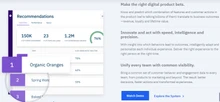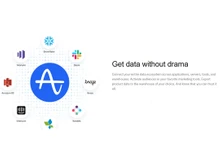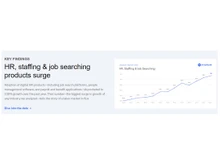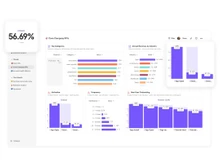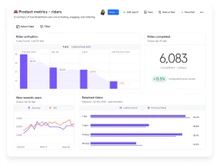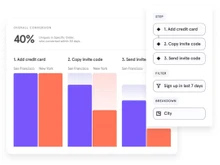When it comes to product analytics, Amplitude and Mixpanel are two leading names that empower businesses to take informed actions based on data. While both platforms share a common goal of aiding businesses in understanding user behavior and optimizing their products or services, they differ significantly in terms of features, functionalities, and overall user experience. Let's delve into a detailed comparison of Amplitude versus Mixpanel across various aspects.
Amplitude vs. Mixpanel: Overview
Amplitude and Mixpanel are leading analytics platforms designed to help businesses make data-driven decisions and optimize their products or services based on user behavior and insights.
Amplitude is acclaimed for its user-centric approach and advanced analytics features, allowing users to gain a deep understanding of user behavior. Its intuitive interface and comprehensive analytics suite make it a favorite among product teams.
Mixpanel, on the other hand, is known for its event-based tracking and real-time analytics capabilities. It enables businesses to track specific user actions and provides them with granular insights into user engagement. Mixpanel's strength lies in its event-driven approach and offers detailed data on how users interact with a product.
Amplitude vs. Mixpanel: Pros and Cons
- Amplitude and some other Amplitude alternatives offer robust cohort analysis features, allowing for advanced segmentation and visualization to track specific user groups over time. Mixpanel, on the other hand, offers a basic cohort analysis with fewer segmentation options and lesser visualizations compared to Amplitude.
- In terms of scalability, Amplitude's infrastructure can easily handle large datasets for optimal performance. Whereas Mixpanel's event-centric approach might result in performance limitations when dealing with massive datasets.
- Amplitude has a built-in A/B testing feature, whereas Mixpanel lacks native A/B testing capabilities and requires thirrd party integrations for experiments.
- Mixpanel offers more flexibility and customization in defining complex event sequences and conditions within the funnel. Amplitude, on the other hand, requires customization beforehand.
Amplitude vs. Mixpanel: In Terms of Features
- Insight reports: Both Amplitude and Mixpanel offer robust actionable insights. However, Amplitude’s inbuilt minor features like calculating averages, summing, running calculations, etc. give it an upper hand over Mixpanel.
- Marketing tools: Amplitude doesn’t offer any marketing tools or notification features to its users. However, Mixpanel and some other Mixpanel alternatives come with a complete Marketing Automation suite, push notifications and it can act like a CRM as well.
- Notifications: The notification feature is not available in Amplitude. On the other hand, with Mixpanel you have the ability to send notifications to other team members via SMS, push notifications, email, and in-app messages.
- Workflow and Reporting Customization: When using Amplitude, you have to customize and create a dashboard in the front and center of its Analytics Workflow. On the contrary, Mixpanel offers a basic workflow dashboard, and it is easier and quicker to work with compared to Amplitude.
Amplitude vs. Mixpanel: User segmentation
Amplitude has powerful segmentation capabilities with user properties, event properties, and custom filters for granular analysis. In contrast, Mixpanel offers simpler segmentation based on user properties and basic event criteria, which is less powerful compared to Amplitude.
Amplitude vs. Mixpanel: Integration
Amplitude can integrate with various project management apps, social media tools, e-commerce platforms, marketing software, etc. Mixpanel can also integrate with multiple apps and platforms, but it may not be as extensive as Amplitude.
Amplitude vs. Mixpanel: User Interface
Amplitude provides a sleek and intuitive user interface, making it easy for users to navigate and access various analytics features. Conversely, Mixpanel’s interface is slightly more complex for beginners. However, its interface is highly customizable, and users can easily create personalized dashboards and reports tailored to their specific needs.
Amplitude vs. Mixpanel: Pricing
Amplitude is a bit expensive compared to Mixpanel. Amplitude’s pricing plans start at $61 per month which include features like unlimited product analytics, custom dashboards and formulas, behavioral Cohorts. On the other hand, Mixpanel pricing starts at $20/month with features like unlimited saved reports & cohorts, advanced sharing controls, and no-code data transformations.
Amplitude vs. Mixpanel: Customer Support
Amplitude provides customer support through its knowledgebase, and AI-based live chat support. However, it lacks basic calling support. On the other hand, Mixpanel offers better customer support compared to Amplitude and it includes chat, phone, email support, and a blog section to solve user issues or inquiries.
Which is Better, Amplitude or Mixpanel?
Both Amplitude and Mixpanel offer powerful product analytics solutions with a wide range of features and capabilities.
Amplitude excels in cohort analytics, scalability, behavioral targeting campaign management and user insights, making it an ideal choice for businesses looking for a complete product analytics and event tracking platform.
On the other hand, Mixpanel stands out for its customization options, simpler user segmentation, mapping travel behavior and cost-effective pricing model. It's well-suited for small businesses and individuals looking for a cost-effective suite without sacrificing functionality.


 5 Ratings & 0 Reviews
5 Ratings & 0 Reviews



